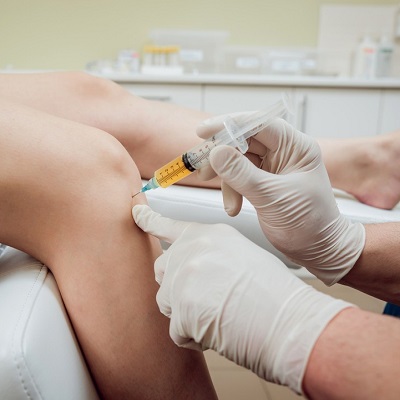
Have you ever wondered whether there’s a miracle cure for knee pain? A remedy that fosters natural healing as well as discomfort relief? Now, hold onto your inquiries as we are going to solve the puzzle: Have you heard about PRP therapy in Islamabad for knees that utilises platelet-rich plasma? Is this novel therapy truly the solution to putting an end to knee problems and embracing a life free from pain? Get to know more about How many PRP sessions are needed for knees.
Exploring the concept of PRP for Knees!
A cutting-edge medical procedure called platelet-rich plasma (PRP) for knees is intended to treat and mitigate a number of conditions relating to the knee. This approach promotes tissue repair, lowers inflammation, and improves the general health of the knee joint by utilising the body’s own natural healing properties.
A straightforward blood sample from the patient—typically taken from the arm—starts the process. After that, this blood is processed in a centrifuge, a specialised tool that isolates the growth factors and platelets from the other blood components. The end product is concentrated plasma abundant in platelets, essential to the body’s self-healing mechanisms.
Ideal Candidates:
Osteoarthritis Sufferers: It can provide treatment for people with osteoarthritis, a degenerative joint ailment. This treatment helps control symptoms, lessen pain, and delay the illness’s advancement.
Patients with Ligament damage: This therapy may be advantageous for patients who have suffered damage to the ACL or MCL, two knee ligaments. PRP’s regenerative qualities can aid in the healing process and enhance knee stability in general.
Meniscus Issues: PRP therapy is appropriate for those with meniscus problems, including tears or degeneration. By promoting meniscus healing, the concentrated platelets may prevent the need for more intrusive operations.
Chronic Knee Pain Sufferers: It may be able to provide relief for those whose chronic knee pain hasn’t improved much with conventional therapies. By addressing the root causes of pain, this therapy encourages the body’s natural healing process.
Benefits Of PRP Therapy:
Some of the advantages are as below.
Discomfort Reduction: PRP injections have the potential to lessen knee discomfort brought on by tendon injuries or osteoarthritis. Platelets include growth factors that can reduce pain and promote healing.
Improved Function: PRP therapy can potentially improve the knee joint’s overall performance, including greater mobility and range of motion. This can be especially helpful for people who have persistent knee problems.
Tissue Repair and Regeneration: Platelets’ growth factors contribute to the promotion of tissue regeneration and repair. PRP can potentially accelerate the repair of injured ligaments, tendons, and cartilage in the knee.
How many PRP sessions are needed for knees?
The severity of the condition and the patient’s response to treatment will determine how many Platelet-Rich Plasma (PRP) sessions are required for knee problems. Typically, a standard protocol has a sequence of injections separated by a few weeks. Patients may typically undergo three to four PRP treatments, separated by one to four weeks. The precise number of sessions, however, may vary depending on the patient’s general health, the type of knee disease being treated, and the doctor’s evaluation of the patient’s progress. Some people might just need a few sessions to experience adequate relief, while others could need more sessions.
Book Your Treatment Now!
We encourage you to arrange a consultation session with our knowledgeable and committed staff at Dynamic Clinic PK. Our experts offer personalised treatments and allow people to see their desired results. For additional information regarding the How many PRP sessions are needed for knees? Contact us at Dynamic Clinic PK.


